
13.4K
Downloads
77
Episodes
Project Good is a social impact podcast interviewing experts and advocates about the pressing problems that we face globally and hearing how they suggest we move forward in the future.
Project Good is a social impact podcast interviewing experts and advocates about the pressing problems that we face globally and hearing how they suggest we move forward in the future.
Episodes
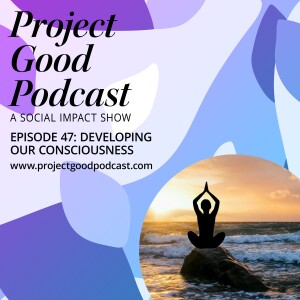
Sunday Apr 07, 2024
Developing Our Consciousness
Sunday Apr 07, 2024
Sunday Apr 07, 2024
Episode summary:
Developing consciousness is a complex and multifaceted topic that spans various fields, including philosophy, psychology, neuroscience, and spirituality. It involves the exploration of self-awareness, understanding one's thoughts and emotions, and cultivating a deeper understanding of the nature of existence.
Consciousness is the capacity of individuals to deal with reality. The more complex the reality, the more need for a conscious approach.
The purpose of consciousness, at an operational level, is to ensure that the difference between what an individual thinks or says about reality and the real facts is minimal.
In today’s world reality is being questioned every day. As a society we need to face the ever-growing list of problems head-on if we want to make change by understanding the many factors that have contributed to the issues and realizing that a one-size-fits-all approach will no longer work as the world has changed.
In this episode, Corrina Grace and I discuss the choices we need to make as a society to move forward on strong moral ground.
Topics discussed in this episode:
- In My blood [4:00]
- The Decision [6:40]
- Do They Want Change [8:30]
- Values [18:00]
- The Three Steps [23:33]
- People, Process and Place [25:00]
- Shaping the Future [30:00]
- Shielding the Truth [34:00]
- Holding an Open Heart [36:22]
- Acknowledge Pain [38:32]
- Transactional Relationships [45:00]
Quote:
“We have a misunderstanding of interconnectedness thinking of it as tribalism … and we are having trouble dealing with paradox in society.”
Guest Bio:
Corrina Grace the author of the book The Weaver’s Way. The Weaver’s Way provides a blueprint for shaping change that harnesses our deep inner instinct for connection and caring. Within that blueprint lies a new story for shaping change, one built on an understanding of the world as interdependent and interconnected. It makes the privilege of shaping change as inclusive and accessible as the old way was exclusive and elite.
Corrina Grace she is a social entrepreneur, engineer, author, and sustainability leader with 15+ years building and strengthening social impact organizations. Additionally, she has spent 10+ years living and working with disenfranchised, economically marginalized communities on the frontlines of climate change and has solidified a personal commitment to ensuring justice and equality for People + Planet, a commitment that shapes her work at all levels.
Connect with us:
- Subscribe to the Project Good Work Blog to read the article version of the interview.
- If you have a passion for an unserved community, a social justice problem or want to change minds contact Project Good Work at www.ProjectGood.Work to start your project of change today.
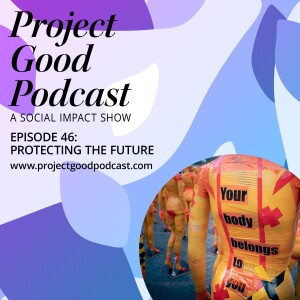
Friday Mar 15, 2024
Protecting Our Future
Friday Mar 15, 2024
Friday Mar 15, 2024
Child sexual abuse is a deeply concerning issue that has significant implications for the well-being of individuals and societies worldwide.
The prevalence of child sexual abuse varies across regions and populations. According to the World Health Organization (WHO), globally, an estimated 18% of girls and 8% of boys experience sexual abuse before the age of 18. Child sexual abuse is often underreported due to various factors, including fear, shame, stigma, and lack of awareness or trust in support systems. It is believed that many cases go unreported, making it challenging to accurately gauge the full extent of the problem.
Child sexual abuse can have profound and long-lasting effects on the mental health and well-being of survivors. Survivors may experience a range of psychological consequences, including post-traumatic stress disorder (PTSD), depression, anxiety, low self-esteem, and difficulties forming healthy relationships.
Certain factors may increase the risk of child sexual abuse, including family dysfunction, substance abuse within the family, poverty, exposure to violence, and lack of protective factors such as strong social support networks.
Perpetrators of child sexual abuse can be individuals known to the child, such as family members, relatives, caregivers, or trusted adults, as well as strangers. Perpetrators may use coercion, manipulation, threats, or physical force to exploit and victimize children.
In this episode, we discuss the signs, how to prevent, and what to do with expert Joelle Casteix.
Topics discussed in this episode:
- Joelle’s Story [7:00]
- The Increase in Abuse [16:00]
- No Need to Talk About Sex [19:50]
- Surprises and Secrets [23:00]
- A Prevention Community [25:00]
- The Digital Aspects of Prevention [28:00]
- Disclosure [40:00]
- Spirituality [42:00]
- Best Books for Prevention [46:22]
- Signs of Abuse [50:20]
- Why Care [52:00]
Quote:
“To help prevent child sexual abuse, teach your children the proper names of their body parts.”
Guest Bio:
Advocate, speaker, and author Joelle Casteix knows the statistics and experience of sexual abuse all too well. She is a leading global expert, author, and keynote speaker for survivors of child sexual assault and institutional cover-up. With more than two decades of strategic communications experience, Casteix is an expert in child sexual abuse prevention, digital accountability, social media safety, and international online privacy issues.
Since coming forward publicly in 2002 as a survivor of child sexual abuse, Casteix has devoted her career to exposing abuse, advocating on behalf of survivors, and spreading abuse prevention strategies for parents and communities. She is a regular speaker for the National Center for Victims of Crime, the Institute on Violence, Abuse and Trauma, and The Survivors Network of those Abused by Priests. Casteix runs the Worthy Adversary blog, which provides information and commentary on child sexual abuse prevention and exposure and is the host of two podcasts, The UNASKED Podcast and SpotTheLine podcast.
Find out more at: https://www.casteix.com/
Connect with us:
- Subscribe to the Project Good Work Blog to read the article version of the interview.
- If you have a passion for an unserved community, a social justice problem or want to change minds contact Project Good Work at www.ProjectGood.Work to start your project of change today.
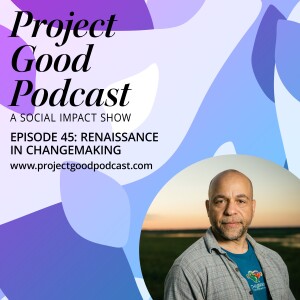
Tuesday Feb 13, 2024
Renaissance in Changemaking
Tuesday Feb 13, 2024
Tuesday Feb 13, 2024
Born in 1958 Hans Hageman has lived a full life working to make a difference around the world.
Hageman graduated with honors from Collegiate School for Boys, received a B.A. from Princeton University in 1980, and a J.D. from Columbia University School of Law.
In 1992, he co-founded and served as Executive Director for The East Harlem School at Exodus House located in East Harlem, New York City. In 2002, he founded the Sulaxmi School for Girls in Lucknow, India.
In 2005, he founded the Emily N. Carey Harbor School in East Harlem, New York City.
He has also held positions as a Manhattan assistant district attorney in the Office of Special Narcotics Prosecution, as chief counsel for the Neighborhood Defender Service of Harlem, and as minority chief counsel and staff director of the U.S. Senate's Constitution subcommittee.
In this episode, we review what it takes to become a changemaker from the amazing life experience of Hans Hageman who lived through some of the most epic times of change-making in our lives in the United States.
Topics discussed in this episode:
- Who is Hans Hageman [7:00]
- Leaving the System [13:30]
- Choosing a Life Direction [19:50]
- Moving Pass Wounds [26:00]
- The Sidelines are Gone [28:00]
- Putting on Your Oxygen Mask [30:00] - New Thinking and Good Food [33:33] - Africa Funding Barriers [40:00]
- Societal Blocks [47:15]
- Pushing History Forward [50:20] - Courage [55:00]
- War for Change [60:00]
Quote:
“I want to be an ancestor worth remembering.”
Guest Bio:
Hans Hageman is a social entrepreneur. He has developed visionary solutions to improve education from Harlem to India. Hans grew up in Spanish Harlem, New York. His home was Exodus House, a pioneering residential drug treatment center started by his father.
Hans’s parents were his first teachers in the importance of service to others. He went on to attend Princeton University and Columbia University School of Law. After law school, he went on to work as a prosecutor, chief counsel to a U.S. Senate subcommittee, and as a defense attorney.
In the early 1990s, he shifted his mission to working with children who had been underserved by the education establishment. This led to his founding of the East Harlem School at Exodus, an independent school that predated charter legislation in New York. His work there was honored with an Essence Magazine award and the Robin Hood Foundation.
His work there was honored with an Essence Magazine award and the Robin Hood Foundation Heroes Award, among others. It also brought him national media coverage from CNN, the New York Times, People Magazine, and the major television networks.
Connect with us:
- Subscribe to the Project Good Work Blog to read the article version of the interview.
- If you have a passion for an unserved community, a social justice problem or want to change minds contact Project Good Work at www.ProjectGood.Work to start your project of change today.
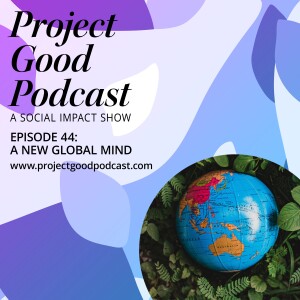
Friday Jan 19, 2024
A New Global Mind
Friday Jan 19, 2024
Friday Jan 19, 2024
Millions of Americans experience symptoms of mental health conditions each year, and the number of people seeking care is trending upward. While a mental health diagnosis may impact an individual’s daily life, it can also have a ripple effect across families, communities, and even economies.
Here are some eye-opening Mental Health Statistics at a Glance
-
21% of U.S. adults experienced a mental health condition in 2020.
-
In 2020, 32.1% of U.S. adults experienced both a mental health condition and substance abuse
issue.
-
As of 2020, suicide is the second leading cause of death for U.S. children ages 10 to 14, preceded only by unintentional injury.
-
The impact depression and anxiety have on the global economy can be measured in 1 trillion dollars in lost productivity each year.
-
In 2020, 51.2% of U.S. females received mental health services.
-
Young adults ages 18 to 25 in the U.S. have the highest rate of experiencing any mental health
concerns.
In this episode, Dr. Noah St. John discusses how having a healthy mind is key to your overall health and well-being. A healthy mind includes emotional, psychological, and social well-being and affects how you think, feel, and act. It works in unity with your body and influences how you handle stress, relate to others, and make choices.
Topics discussed in this episode:
- Dr. Noah’s Story [5:00]
- Seeking Purpose [8:30]
- Knowing What You Want [10:50]
- Barriers Holding People Back [12:37] - Self- Sabotaging [16:50]
- Building a Better Future [23:00]
- Fear Factor [25:11]
- Boundaries [30:11]
- Belief Systems [34:06] - Goals [38:20]
Quote:
“It’s about more than money, it's about meaning.”
Guest Bio:
Dr. Noah St. John is the founder and CEO of an international success training company. He has helped People and organizations in more than forty countries using his breakthrough methods to get rid of their "head trash" and enjoy more control, freedom, and abundance in their lives and careers. He is the author of Permission to Succeed and The Great Little Book of Afformations, which have been translated into four languages. He has appeared on CNN, ABC, NBC, CBS, and Fox News, and has been featured
in Parade, Woman's Day, Modern Bride, Los Angeles Business Journal, the Chicago Sun-Times, the Washington Post, InStyle magazine, and Selling Power.
Connect with us:
- Subscribe to the Project Good Work Blog to read the article version of the interview.
- If you have a passion for an unserved community, a social justice problem or want to change minds contact Project Good Work at www.ProjectGood.Work to start your project of change today.
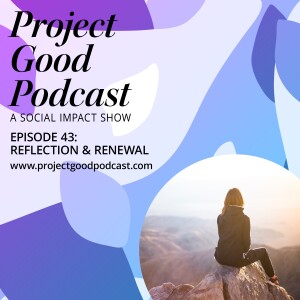
Wednesday Jan 10, 2024
Reflection & Renewal
Wednesday Jan 10, 2024
Wednesday Jan 10, 2024
According to Forbes Article Nine, Surprising Things Holding You Back from Being Successful. Most times people aren't even aware of what's truly holding them back. Noted in the article or the following list of things that hold people back the most.
- They're following someone else's definition of success due to a lack of inner work.
- A lot of our behaviors don't align with who we are.
- You're adhering to outdated social norms.
- You aren't currently connected to your truth.
- You end up in jobs that you aren't a good fit for.
- You follow the advice that sounded good but felt wrong.
- You stay stuck in your comfort zone because you're afraid to fail.
- You have a scarcity mindset when it comes to money.
- You lack confidence.
In this episode, we explore self-reflection with Tracy Pleschourt, the Founder of Self-Made U who helps men and women create Self-Made wealth and wellness through life coaching. Tracy has mastered and now teaches the critical skills necessary to manage your mind and overcome any obstacle, including overeating, overdrinking, time management, career and relationship changes.
Topics discussed in this episode:
- Facing Personal Barriers [7:14]
- Living in Alignment [9:26]
- Making Decisions [15:31]
- Feeling Emotions [18:48]
- Right Brain [21:57]
- Self Control [23:02]
- Tap into Your Prodigy Brain [30:37]
- Daily Planner [32:11]
- Mental Health [35:06]
- On Track for the Year [43:20]
Quote:
“Make a decision to actually commit to decisions … Ask yourself what would be so easy that it is hard not to do. And you have to answer it.”
Guest Bio:
Tracy Pleschourt, the Founder of Self-Made U helps men and women create Self-Made wealth and wellness through life coaching. Tracy has mastered and now teaches the critical skills necessary to manage your mind and overcome any obstacle, including overeating, over drinking, time management, career & relationship changes.
Just a few years ago, Tracy was a successful, advertising executive. Stifled by the rigorous, time-consuming demands of the corporate world, she traded in her 20 years of advertising to pursue her real passion: life & weight loss coaching.
Tracy is a student of her own work and has stopped overeating, overdrinking, and created a multi six figure business while mastering metabolic health. Today, Tracy coaches people all across the country who want to do the same.
Tracy dedicates her work to ambitious, life-long learners yearning for answers and seeking a better way to create the results they desire and deserve. She instills confidence and a call to action that leads to unlimited wealth and wellness.
Connect with us:
- Subscribe to the Project Good Work Blog to read the article version of the interview.
- If you have a passion for an unserved community, a social justice problem or want to change minds contact Project Good Work at www.ProjectGood.Work to start your project of change today.
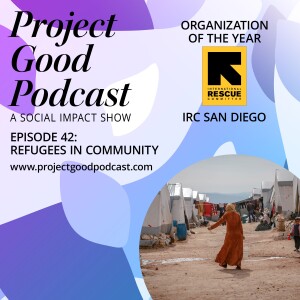
Friday Dec 29, 2023
Refugees in Community
Friday Dec 29, 2023
Friday Dec 29, 2023
Refugees are individuals who have fled their home countries due to fear of persecution, conflict, violence, or other forms of serious harm.
(STAT From UNHCR – The UN Refugee Agency)
At the end of June 2023, an estimated 110 million people remained forcibly displaced by persecution, conflict, violence, human rights violations, and events seriously disturbing public order, 1 percent more than at the end of 2022.9 UNHCR estimates that the global number of people forcibly displaced has grown during the following three months, and at the end of September 2023 is likely to have exceeded 114 million people.10 The mid-year total represents an increase of 1.6 million compared to the end of 2022. More than 1 in 73 people worldwide remained forcibly displaced as a result,11 88 percent of them in low- and middle-income countries. Most people who are forced to flee never cross an international border, with just 10 countries accounting for more than three-quarters of all people displaced within their own country. Similarly, over 87 percent of all refugees under UNHCR’s mandate and other people in need of international protection originated from just 10 countries.
International Rescue Committee Mission
The mission of the International Rescue Committee is to help people whose lives and livelihoods are shattered by conflict and disaster to survive, recover, and gain control over the future.
In this episode, we celebrate IRC San Diego and its work in the San Diego, California area working to bring displaced people into the community after losing their homes and facing danger in their countries. The organization provides services for housing, employment, food, clothing, and basic information for resettlement.
Since opening its doors the IRC has helped thousands of people make the difficult transition from one country to the next and given hope to the futures of refugees.
Topics discussed in this episode:
- IRC Mission [3:31]
- Who is a Refugee [9:08]
- Women [10:06]
- Refugee Migration Locations [15:49] - The Refugee Process [18:00]
- Barriers [24:44]
- Funding [30:37]
- Most Remarkable Thing [33:40]
- Community [37:23]
Quote:
“People, they've fled their homes. They want to feel safe and secure, and they want to feel like they're a part of our society and that they belong, and that's what the community is.”
Connect with us:
- Subscribe to the Project Good Work Blog to read the article version of the interview.
- If you have a passion for an unserved community, a social justice problem or want to change minds contact Project Good Work at www.ProjectGood.Work to start your project of change today.
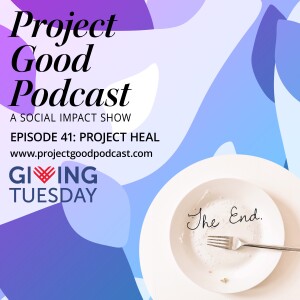
Tuesday Nov 07, 2023
Project Heal (Giving Tuesday)
Tuesday Nov 07, 2023
Tuesday Nov 07, 2023
Episode summary:
Project HEAL (Help to Eat, Accept, and Live) is a nonprofit organization in the U.S. focused on equitable treatment access for eating disorders. Project HEAL is the only major direct service nonprofit in the U.S. focused on equitable healthcare access for people with eating disorders. The organization's mission is to break down systemic, healthcare, and financial barriers to eating disorder treatment. The mission is delivered through four core Treatment Support programs: Insurance Navigation, Treatment Placement, Cash Assistance, and Clinical Assessment. Project HEAL is also active in research, education, and advocacy at the national level. The organization's vision is that everyone with an eating disorder has the resources and opportunities they need to recover.
Eating disorders are complex mental health conditions that can have serious physical and psychological consequences. Here are some important facts about eating disorders:
- Types of Eating Disorders: There are several types of eating disorders, including anorexia nervosa, bulimia nervosa, binge-eating disorder, and other specified feeding or eating disorders (OSFED). Each has its own distinct characteristics.
- Anorexia Nervosa: Individuals with anorexia have an intense fear of gaining weight and a distorted body image. They often severely restrict their food intake, leading to significant weight loss and health problems.
- Bulimia Nervosa: People with bulimia engage in recurrent episodes of overeating (bingeing) followed by behaviors like self-induced vomiting, laxative use, or excessive exercise to compensate for the calorie intake.
- Binge-Eating Disorder: This involves recurring episodes of consuming large quantities of food, often in a short period, without any compensatory behaviors. It can lead to obesity and related health issues.
- Prevalence: Eating disorders affect people of all genders and ages. They are most commonly diagnosed in adolescents and young adults, but they can develop at any stage of life.
- Causes: Eating disorders are thought to result from a combination of genetic, biological, psychological, environmental, and societal factors. Low self-esteem, perfectionism, and societal pressures related to body image can contribute to their development.
Topics discussed in this episode:
- What is an eating disorder [6:53]
- How Do You Identify an Eating Disorder [11:25]
- What Causes Eating Disorders [16:05]
- Society [20:30]
- Children & Eating Disorders [23:00]
- Body Positivity Movement [25:00]
- Who is Affected by Eating Disorders[31:54]
- Treatment [38:48]
- Health Food Relationship [49:00]
Quote:
“It is not just about not eating, it's about how you feed yourself.”
Resources:
Avoidant Restrictive Food Intake Disorder
Binge Eating Disorder
2017 Forbes 30 Under 30 Social Entrepreneurs
Connect with us:
- Subscribe to the Project Good Work Blog to read the article version of the interview.
- If you have a passion for an unserved community, a social justice problem or want to change minds contact Project Good Work at www.ProjectGood.Work to start your project of change today.
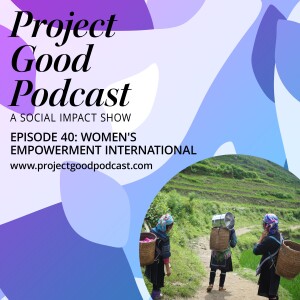
Thursday Oct 19, 2023
Women’s Empowerment International
Thursday Oct 19, 2023
Thursday Oct 19, 2023
Episode summary:
Microloans have been instrumental in empowering women in many parts of the world, particularly in developing countries. These small, short-term loans are typically provided to individuals or small groups to help them start or expand small businesses, which can lead to increased income and economic stability. Here's how microloans have had a positive impact on women:
- Financial Inclusion: Microloans provide women who may not have access to traditional banking systems with an opportunity to access credit. This can be especially important in patriarchal societies where women may have limited financial independence.
- Poverty Alleviation: By starting or expanding small businesses, women can generate income to support their families and improve their living standards. This economic stability can help lift them and their families out of poverty.
- Empowerment: Women who receive microloans often gain a sense of empowerment and self-confidence as they become financially self-reliant. This empowerment can extend beyond economics and affect their overall well-being.
- Gender Equality: Microloans can help promote gender equality by giving women opportunities to participate in economic activities and decision-making processes. This can challenge traditional gender roles and stereotypes.
- Education and Health: Increased income from microloans can be used to invest in education and healthcare for both women and their children. This, in turn, can lead to improved health and educational outcomes for the family.
- Community Development: Women who benefit from microloans often reinvest their earnings into their communities, leading to local economic development and job creation.
- Reduced Vulnerability: Access to credit can help women weather economic shocks and crises, making them less vulnerable to sudden income losses.
- Repayment Rates: Women borrowers have often demonstrated higher repayment rates compared to men, making them attractive clients for microfinance institutions.
- Social Networks: Microloans often involve group lending, which encourages women to form social networks and support systems, allowing them to learn from and assist each other.
Overall, microloans have played a significant role in promoting women's economic empowerment and have been an important tool in the fight against gender inequality and poverty in many parts of the world.
Topics discussed in this episode:
- Our Difference [9:23]
- Trust & Impact [11:25]
- Diversity [15:00]
- Not Just the Money [20:29]
- Partnership [21:50]
- Change Agents [25:00]
- What is the Face of Philanthropy [32:00]
- Women’s Empowerment [34:00]
Quote:
“The face of philanthropy should be everyone.”
Connect with us:
- Subscribe to the Project Good Work Blog to read the article version of the interview.
- If you have a passion for an unserved community, a social justice problem or want to change minds contact Project Good Work at www.ProjectGood.Work to start your project of change today.
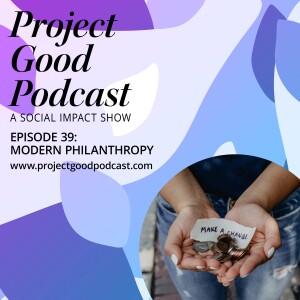
Thursday Oct 05, 2023
Modern Philanthropy
Thursday Oct 05, 2023
Thursday Oct 05, 2023
Episode summary:
Traditional philanthropy refers to the conventional and well-established approach to charitable giving and social impact. It has been the predominant model for many years and encompasses various characteristics, including:
- Financial Donations: Traditional philanthropy often involves individuals, corporations, or foundations providing monetary donations to nonprofit organizations or causes they wish to support. These contributions can range from small individual donations to large-scale grants and endowments.
- Established Foundations: Many traditional philanthropists set up private or family foundations as a means to manage and distribute their charitable giving. These foundations have specific missions or focus areas and work to provide financial support to various nonprofit organizations aligned with their goals.
- Focus on Tax Deductible Donations: In many countries, traditional philanthropy leverages tax incentives, where donors can receive tax deductions or credits for their charitable contributions, encouraging more giving.
- Reactive Giving: Traditional philanthropy often involves responding to immediate needs and crises. Donors may support causes like disaster relief, health initiatives, education, and poverty alleviation, among others.
- Top-Down Approach: In traditional philanthropy, decision-making typically resides with the donors or their appointed board members. The recipients of the funding are generally passive beneficiaries.
- Large-Scale Initiatives: Traditional philanthropy is often associated with significant contributions and projects that can have substantial impacts. These initiatives may involve partnerships with governments and other major institutions.
- Public Recognition: Some traditional philanthropists seek public recognition for their charitable efforts, aiming to inspire others to give and generate awareness for the causes they support.
- Long-Term Commitments: While traditional philanthropy can address immediate needs, it also involves long-term commitments to sustained support for selected causes or organizations.
- Nonprofit Sector Support: Traditional philanthropy plays a crucial role in sustaining the nonprofit sector, providing vital funding to organizations working towards social good.
It is important to note that philanthropy has been evolving over the years, and new models and approaches have emerged. For instance, impact-driven philanthropy, venture philanthropy, and social entrepreneurship are among the newer trends in the philanthropic landscape, emphasizing outcomes, data-driven decision-making, and innovative solutions.
In Modern Philanthropy everyone in society is and can be involved, a person no longer must be white, male, and wealthy. Individuals get together and pool their money, time, and commitment to a cause, issue, or opportunity they see for their community to bring about change on a holistic level. This new approach takes the power out of the hands of a few and places it in the hands of those most intimately involved or devoted to seeing the improvement they desire.
Topics discussed in this episode:
- Philanthropy Together [6:00]
- Covid and Philanthropy [13:00]
- Trust and Relationships [20:00]
- DEI [22:29]
- Funding Level + Local Funding [23:50]
- Devotion to Change [28:00]
- Beloved Community [30:00]
- Diversify Your Funding [34:00]
- The Authentic Relationships [40:00]
- Philanthropy [45:00]
Quote:
“We are reclaiming philanthropy; philanthropy is about loving humanity.”
Connect with us:
- Subscribe to the Project Good Work Blog to read the article version of the interview.
- If you have a passion for an unserved community, a social justice problem or want to change minds contact Project Good Work at www.ProjectGood.Work to start your project of change today.
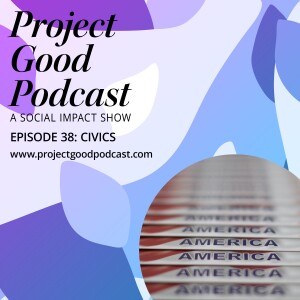
Tuesday Sep 05, 2023
Civics
Tuesday Sep 05, 2023
Tuesday Sep 05, 2023
Episode summary:
Understanding civics is crucial for being an informed and engaged citizen. Here are some key reasons why it is important:
- Participating in Democracy: Civics education helps citizens understand the principles and functioning of a democratic society. It equips individuals with knowledge about their rights, responsibilities, and the mechanisms of government. With this understanding, citizens can actively participate in democratic processes, such as voting, running for office, and engaging in public debates.
- Making Informed Decisions: Civics education promotes critical thinking and provides citizens with the tools to analyze complex issues. By learning about different perspectives, political systems, and the role of media, citizens can make informed decisions on matters that affect their lives and communities. This knowledge helps them navigate political debates, evaluate policy proposals, and contribute to the betterment of society.
- Protecting Individual Rights: A fundamental aspect of civics education is learning about constitutional rights and civil liberties. Understanding these rights empowers citizens to recognize and protect their own freedoms, as well as those of others. By being aware of their legal rights and responsibilities, citizens can actively engage in advocating for justice, equality, and fairness in their communities.
- Holding Government Accountable: Civics education provides citizens with an understanding of the structure and functions of government. This knowledge allows individuals to hold their elected representatives accountable for their actions and decisions. By knowing how government works, citizens can monitor policy-making processes, participate in public consultations, and voice their concerns to ensure transparency and responsiveness from public officials.
- Fostering Civic Engagement: Civics education plays a vital role in fostering civic engagement and a sense of community. It encourages citizens to actively participate in public affairs, volunteer for community initiatives, and work towards the betterment of society. Understanding civics helps citizens appreciate the interdependence of individuals and their communities, encouraging them to contribute positively to the collective well-being.
- Promoting Social Cohesion: Civics education also promotes social cohesion by fostering an understanding and appreciation of diverse perspectives and cultures. It teaches citizens about the principles of equality, respect, and tolerance, fostering an inclusive society. By understanding civics, citizens can work towards addressing social issues, resolving conflicts, and promoting harmony among individuals with different backgrounds and beliefs.
In summary, understanding civics is vital for citizens to actively participate in democracy, make informed decisions, protect individual rights, hold government accountable, foster civic engagement, and promote social cohesion. It empowers individuals to become responsible and active participants in their communities, contributing to the betterment of society as a whole.
Topics discussed in this episode:
- Why Civics is Important [6:30]
- Apathy [12:00]
- Where to Start [18:00]
- People Want to be Right [23:00]
- Democracy is Hard Work [30:50]
- Growing Pains [36:00]
- Creating Boundaries [42:00]
- Signals and Symbols [46:00]
- Make Noise with Your Group [52:14]
- How to Start [58:00]
Quote:
“Let’s say you’re right.”
Connect with us:
- Subscribe to the Project Good Work Blog to read the article version of the interview.
- If you have a passion for an unserved community, a social justice problem or want to change minds contact Project Good Work at www.ProjectGood.Work to start your project of change today.
